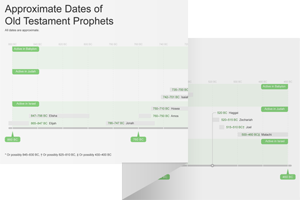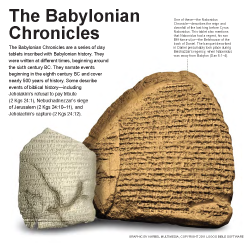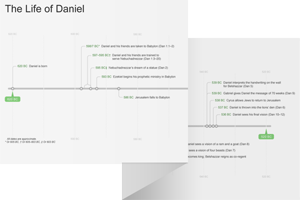1:1–7 The book of Daniel |
1:1 the third year The third year of Jehoiakim’s reign (606 bc) does not coincide with the known siege of Jerusalem by Nebuchadnezzar in 597 bc (compare v. 1 with 2 Kgs 24:10–12; 2 Chr 36:9–10)—a discrepancy that makes it difficult to determine when Daniel was taken to Babylon. The sources Daniel used to determine his dates no longer exist and vary with the sources we have today.
was taken to Babylon. The sources Daniel used to determine his dates no longer exist and vary with the sources we have today.
Regnal Chronology | |
Accession Year System | Length of reign begins at New Year |
Non-Accession Year System | Length of reign begins at coronation |
Postdating System | Length of reign begins after first full year |
Nebuchadnezzar King of Babylon from 605 to 562 bc.
Known as a master builder and military architect, Nebuchadnezzar |
besieged it According to the Babylonian Chronicles, Nebuchadnezzar’s siege of Jerusalem occurred in 597 bc.
1:2 into his hand Expresses the sovereignty of God over the nations—a theme repeated throughout the book. God can direct the destinies of foreign kingdoms and rulers, as well as His own people. Judah’s exile to Babylon is also viewed within this framework.
the land of Shinar The ancient Hebrew name for Babylon, used here, was “Shinar” (see Gen 11:2 and note).
he brought the utensils See 2 Chronicles 36:10. In ancient Near Eastern warfare, placing the objects of a defeated enemy in the temple of one’s god was a common practice. It represented a thanksgiving offering for victory in battle and expressed superiority over the god of the defeated enemy. Israel’s God will eventually punish Babylon for this offense.
for victory in battle and expressed superiority over the god of the defeated enemy. Israel’s God will eventually punish Babylon for this offense.
of his gods Marduk or Bel. Rather than add further shame to the captives by destroying the vessels, Nebuchadnezzar preserves them. While Nebuchadnezzar is eventually punished for his pride, Daniel presents him here in a positive light.
or Bel. Rather than add further shame to the captives by destroying the vessels, Nebuchadnezzar preserves them. While Nebuchadnezzar is eventually punished for his pride, Daniel presents him here in a positive light.
 Pagan Deities in the Old Testament Table
Pagan Deities in the Old Testament Table
1:3 And the king Being Nebuchadnezzar.
of his court officials The Hebrew word here, saris (often translated “eunuch” or simply “official”), is used to designate a trusted royal official (Gen 37:36; 2 Kgs 23:11).
some of the Israelites Babylonians often detained and educated royal captives. These captives could later be returned to their homeland as influential sympathizers to their overlords.
1:4 youths who have no physical defect Ideal physical specimens. In addition to being handsome and healthy, these young men possessed intelligence, a teachable spirit, and poise. The training they received due to their royal heritage gave them great capacity for service in Babylon.
teach them the literature and the language Indoctrination was the key to successfully integrating captives into their new homeland. In addition to learning the history of their overlords, captives would also learn their language and religious practices. The incorporation of political, cultural, and religious education made captives look favorably upon those who conquered them. They could then be used by their overlords to spread Babylonian ideologies and propaganda.
1:5 three years The allotted period of training in the Persian system to become a master of spiritual learning according to the Avesta—a collection of sacred texts used by Zoroastrian priests. This length of training for priests may have been the same in Nebuchadnezzar’s Babylon.
priests. This length of training for priests may have been the same in Nebuchadnezzar’s Babylon.
1:6 Daniel Means “God is my judge.”
Little is known of Daniel outside of the biblical book bearing his name. At some point in Nebuchadnezzar’s conquest of Palestine, Daniel was taken captive to Babylon and served in the king’s court. He is renowned for his wisdom and ability to interpret dreams and omens. Portrayed as the quintessential Jewish sage, he serves as a model of covenant fidelity and righteousness (see Dan 2:14 and note). |
Hananiah, Mishael and Azariah These Hebrew names identify the three young men with the God of Israel: Hananiah (“Yahweh has acted graciously”); Mishael (may mean “Who is what God is”); and Azariah (“Yahweh has helped”). The changing of their names in v. 7 places them firmly in the Babylonian courts.
the Judeans The royal tribe (see Gen 49:9 and note; Rev 5:5 and note).
1:7 gave them names A common custom in this time period was that a king would rename foreigners who were brought to the king’s court as captives. For Daniel and Azariah, the Hebrew references to God in their names (-el for God or -iah for Yahweh) are replaced with references to Babylonian deities like Nabu or Marduk (also called Bel). Their new names symbolized serving Babylon.
Jewish and Babylonian Names | |
Daniel | Belteshazzar |
Hananiah | Shadrach |
Mishael | Meshach |
Azariah | Abednego |
1:8–21 Now that the Jews are in Babylon, they need leaders who will act and speak on behalf of God. The four youths from v. 6 fill this role. Verses 8–21 provides the first demonstration of God’s favor on the exiles. Daniel and his friends determine to eat according to the standards of the Law, and God provides for them by granting them success in a challenge to the palace master. By the end of the challenge, all four men are distinguished before the king, foreshadowing what is to take place in the remaining chapters. |
1:8 he would not defile himself Daniel refused to consume the royal rations. This episode establishes Daniel as the leader of the captive youths. The defilement spoken of here is likely related to the concept of eating unclean foods (i.e., ritual impurity; see Lev 7:19–27). The king’s food and drink may have been unclean because of food type, improper preparation, contact with dead or other impure objects, or because it was sacrificed or poured out to idols. The youths go to extreme measures to protect themselves from defilement. Their activities also show their resistance to assimilating into Babylonian culture.
Abstinence from Gentile foods has a long tradition in this period and later. It is mentioned in the deuterocanonical books: Additions to Esther 14:17; Tobit 1:10–11; Judith 12:1–4; 1 Maccabees 1:61–62; and Jubilees 22:16. Compare Hos 9:3–4; Ezek 4:13. he requested Daniel is respectful of authority and follows protocol in seeking a new diet.
1:9 God gave Daniel favor God influences the disposition of foreign palace officials (see Dan 1:2 and note).
1:10 you will endanger my head Babylonians regarded captives of this caliber as highly valuable. If the king noticed a downturn in their health or appearance, he would likely become angry and demand the supervisor be replaced.
1:11 asked the guard Ashpenaz, the chief official of the king (see v. 3), defers some of his responsibility by placing the four Hebrew youths under the care of his steward. Daniel receives favor and compassion, suggesting that Ashpenaz probably found a way to honor his request.
1:12 test your servants Rather than risk appearing unhealthy by abstaining from the king’s food for three years, Daniel suggests a brief test. His deferential language makes the request more palatable.
1:13 the young men who are eating the fine food of the king The other Hebrew youths brought to Babylon in the exile.
1:16 continued to withhold their fine food and the wine of The test works; they are permitted to continue their modified diet.
1:17 God gave to them God Himself blesses and advances the Hebrew youths in the foreign court. Their activities will display His power to the nations; through them He will be glorified (e.g., 2:47).
had insight into all visions and dreams Introduces a motif that will resurface throughout the book. The Hebrew words used here for visions and dreams
and dreams designate divine revelation. A vision involves a divine experience that occurs while awake, as an interruption of normal consciousness, while a prophetic dream occurs while sleeping.
designate divine revelation. A vision involves a divine experience that occurs while awake, as an interruption of normal consciousness, while a prophetic dream occurs while sleeping.
 Prophetic Commissioning and the Divine Presence
Prophetic Commissioning and the Divine Presence
1:18 the end of the time The youths have completed the three-year training period. See v. 5 and note.
1:19 they stood before the king God blessed the four Hebrew youths—they are noticeably more qualified than their peers. Consequently, they are assigned prominent positions in the king’s court.
1:20 ten times A rhetorical device that emphasizes their superiority over the other sages.
1:21 the first year of Cyrus the king Refers to the year Babylon came under Cyrus’ control 539 bc. Cyrus became king of Persia in 559 bc. This verse gives the span of Daniel’s career as a courtier in Babylon when it was under Babylonian control (ca. 606–539 bc).
Rulers in the Book of Daniel | |
Nebuchadnezzar | |
Belshazzar | |
Darius the Mede | |
Cyrus the Persian | |

|
About Faithlife Study BibleFaithlife Study Bible (FSB) is your guide to the ancient world of the Old and New Testaments, with study notes and articles that draw from a wide range of academic research. FSB helps you learn how to think about interpretation methods and issues so that you can gain a deeper understanding of the text. |
| Copyright |
Copyright 2012 Logos Bible Software. |
| Support Info | fsb |
 Loading…
Loading…




 Nebuchadnezzar
Nebuchadnezzar